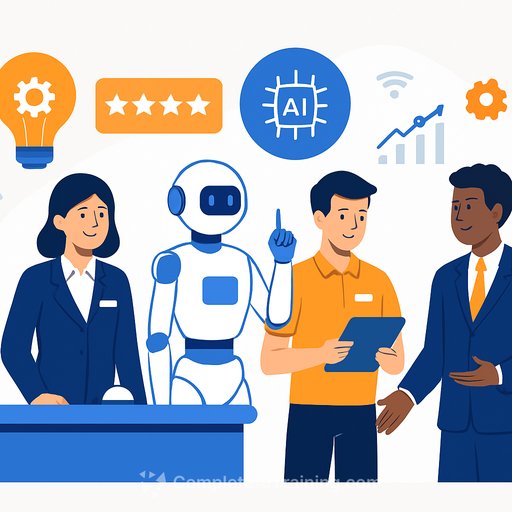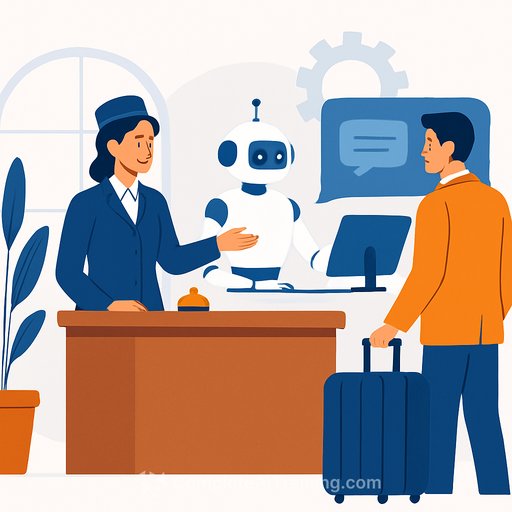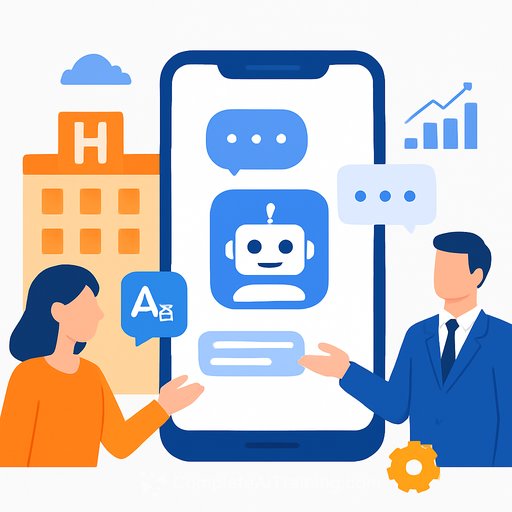Hospitality in the age of AI and automation: redefining guest experiences and the skills leaders need
AI and automation are now part of daily hotel and venue operations. The goal is simple: faster service, smarter decisions, and more meaningful guest moments.
This isn't about replacing people. It's about freeing teams from routine work so they can focus on care, creativity, and high-touch service.
Where AI is moving the guest experience
- Personalized stays: Use guest data (with consent) to suggest upgrades, amenities, and local experiences. Chatbots can handle common requests 24/7 and route complex needs to staff with context included.
- Lean operations: Automate booking confirmations, payments, inventory checks, and task assignments. The result: shorter lines, fewer errors, and more time for staff to be present with guests.
- Direct, instant communication: Mobile apps and messaging let guests request housekeeping, room service, or maintenance without friction. Transparency on status updates reduces calls and repeat requests.
- Smart rooms and IoT: Thermostats, lighting, and voice assistants can adapt to guest preferences. Done right, this improves comfort and lowers energy use without extra steps for the guest.
From convenience to personal connection
- Predictive service: Use historical patterns to anticipate needs-late check-ins, dietary preferences, or peak service times. Proactive touches feel thoughtful and reduce service bottlenecks.
- VR and AR previews: Virtual tours help guests choose rooms, event spaces, and experiences before they arrive. This builds confidence and reduces pre-stay friction.
- Continuous feedback loops: Send automated follow-ups, track themes, and act quickly. Close the loop by showing guests what changed because of their input.
Skills future hospitality leaders need
- Tech proficiency: Comfortable with CRM, data dashboards, AI assistants, and mobile platforms. Know what to automate, what to measure, and what to escalate to humans.
- Emotional intelligence: Empathy, listening, and presence at the point of service. The best tech supports this-it doesn't replace it.
- Adaptability and learning agility: Tools change. Standards don't. Keep testing, training, and refining SOPs without losing the brand's voice.
- Innovation mindset: Encourage experiments, pilot new tools, and sunset what doesn't work. Reward small wins that improve guest satisfaction or staff efficiency.
- Sustainability awareness: Use tech to cut waste and energy while keeping comfort high. Guests notice-and choose brands that care.
90-day implementation playbook
- Weeks 1-2: Audit and goals. Map the guest path from pre-stay to post-stay. Identify 5 friction points. Set simple metrics: response time, upsell rate, average check-in time, service recovery time, and NPS.
- Weeks 3-4: Quick wins. Automate confirmations, pre-arrival messaging, and post-stay surveys. Add a service request hub (app, WhatsApp, SMS-one channel your guests actually use).
- Weeks 5-6: Personalization pilot. Start with one segment (e.g., repeat business travelers). Offer dynamic upgrades, amenity bundles, and local recs. Measure conversion and satisfaction.
- Weeks 7-8: Smart operations. Route tasks to the right staff with priority rules. Connect inventory to F&B and housekeeping to cut delays and stock-outs.
- Weeks 9-10: Team training. Teach staff how to use AI tools, when to step in, and how to add warmth to automated flows. Update SOPs with clear escalation paths.
- Weeks 11-12: Review and scale. Compare metrics to baseline. Keep what works, refine what's close, drop what adds noise. Expand to new segments or properties.
What to measure every week
- Speed: Average response time to guest messages; time from request to resolution.
- Revenue impact: Upgrade and add-on conversion; revenue per occupied room or per attendee.
- Experience: NPS/CSAT, complaint rate, repeat booking rate.
- Efficiency: Check-in duration, housekeeping dispatch time, staff minutes saved per task.
- Sustainability: Energy per occupied room, food waste, linen reuse participation.
Trust, privacy, and brand standards
Be transparent about data use and give guests control over preferences and communications. Limit data collection to what improves service.
Build guardrails: bias checks for recommendations, human review for edge cases, and clear opt-outs. Protect the brand voice across every automated touchpoint.
Looking ahead
The hospitality businesses that win will combine smart automation with genuine human care. Use tech to remove friction; use people to create moments guests talk about.
Set clear goals, start with small pilots, and keep improving. The result is service that feels personal, consistent, and effortless.
For deeper context on industry trends, see Deloitte's latest outlook on travel and hospitality here.
If you're building your team's AI fluency, explore practical programs by job role here.
Your membership also unlocks:






